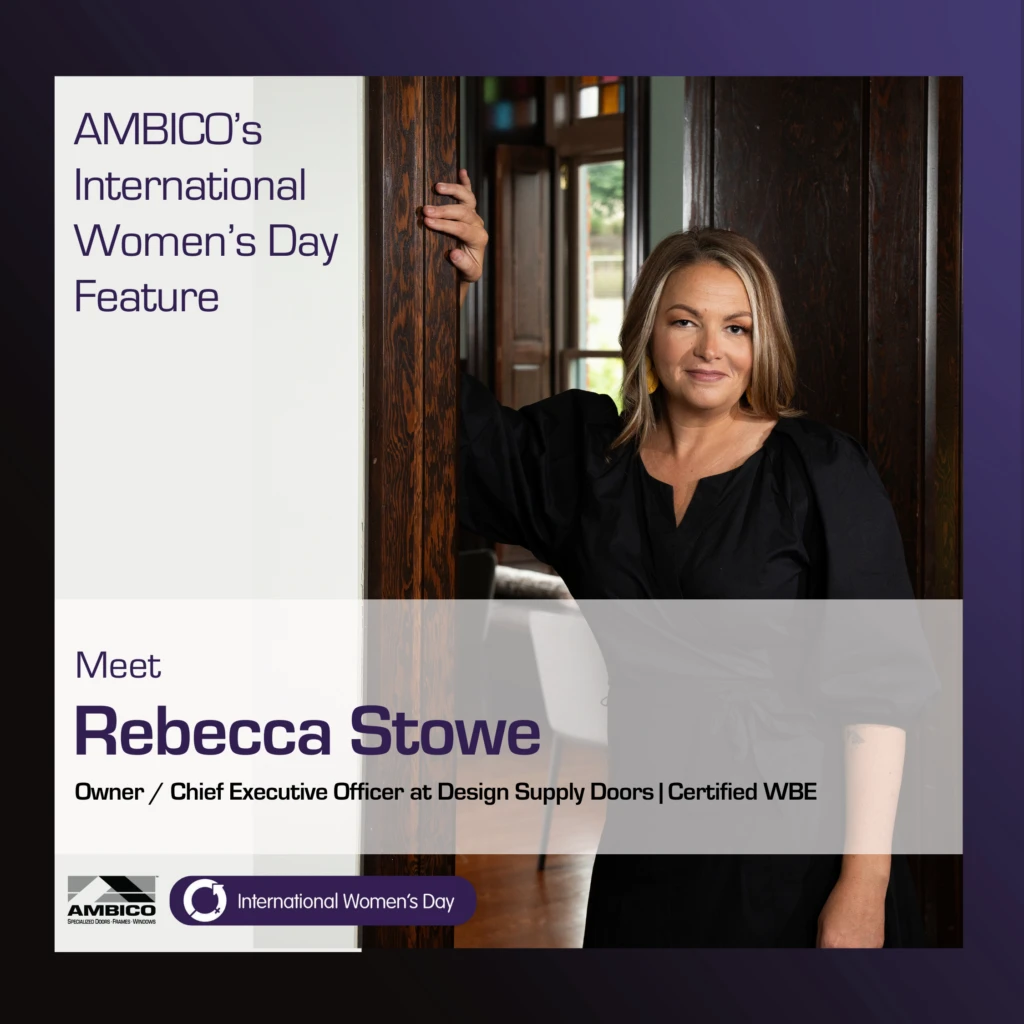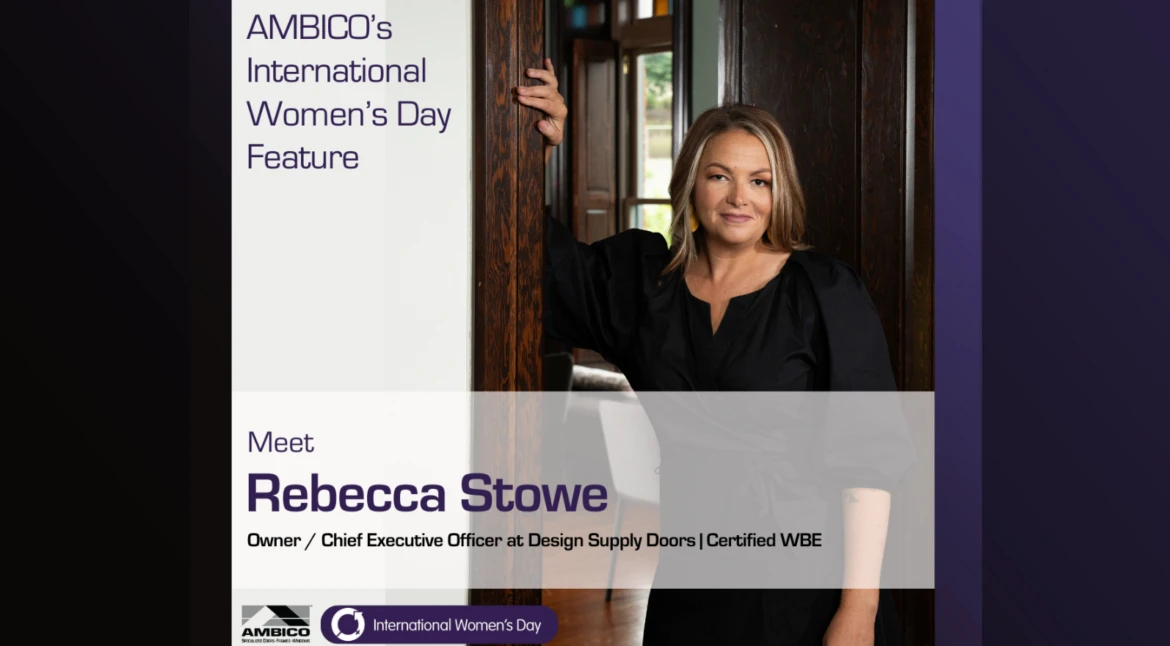From Outsider to Industry Leader: Rebecca Stowe’s Journey in Construction

Rebecca Stowe – Owner / Chief Executive Officer at Design Supply Doors | Certified WBE
Rebecca Stowe never imagined she’d end up in construction—let alone leading a company within the industry. But what started as a three-year trial period into her in-laws’ family business has since become a defining chapter in her life and career.
Today, as majority owner and CEO of Design Supply Doors, Rebecca is reshaping the door and hardware industry through a leadership style rooted in inclusion, resilience, and vision. Her story is one of reinvention, proving that the path into a traditionally male-dominated field can look different—and still lead to remarkable success.
A Bold Career Shift and a Crash Course in Leadership
Rebecca’s transition into the construction industry wasn’t a planned one. After ten years in the corporate marketing world, she found herself craving change. The fast-paced, high-pressure environment left little room for the kind of work-life balance she wanted as a mother of two young children. Around the same time, her husband’s parents, founders of Design Supply Doors, were preparing to retire. The timing couldn’t have been better.
What started then as a three-year transitional period quickly grew into something far more meaningful. Initially, Rebecca and her husband approached the opportunity with caution, agreeing to test the waters and see if this would work for them. Over time, they found their rhythm—not just surviving the experience but thriving in it. That initial trial turned into a long-term commitment, culminating in their official purchase of Design Supply Doors in January 2021.
Stepping into a whole new industry and role, Rebecca quickly realized that while her background in business administration and communications gave her a solid foundation, running a business, especially in construction, required an entirely new set of skills. She immediately put herself through a crash course in accounting, employment and construction law, OSHA compliance, and product training to learn the ins and outs of the industry.
From touring manufacturing facilities to combing through contract language, she made it a point to understand every part of the business, not just oversee it. That hands-on mindset laid the groundwork for the kind of leader she would become.
Establishing Credibility in a Male-Dominated Space
When Rebecca first joined the company, she was often mistaken for office support staff—an experience many women in male-dominated industries will recognize. Some clients assumed she was the new “accounting gal.” Her response? “Some days.” Rather than argue, she let her presence and performance speak for themselves.
“I don’t mind being underestimated,” she says. “In fact, I kind of prefer it. Those moments fueled my determination to learn and grow.”
In the beginning, many in the business viewed Rebecca as just “the wife.” She understood that being married to someone in the business didn’t automatically earn her credibility, it had to be built. So, she put in the work, not only to gain technical knowledge but to lead with clarity, purpose, and confidence. More than anything, she wanted to prove to her team, her clients, and herself that she wasn’t just present in name. She was there to lead.
Thankfully, Rebecca didn’t have to navigate all this alone. “I have been incredibly fortunate to find amazing women who helped me navigate the first few years in the industry,” she says. Organizations like NAWBO (National Association of Women Business Owners), WCOE (Women Construction Owners & Executives), the Women of Influence program, and Vistage were instrumental in her journey. These groups offered more than just a support network, they provided critical insight into the countless areas a business owner must become a semi-expert in, from financials to operations, while helping her gain a deeper understanding of how to thrive in the construction industry.
Looking back, she credits those early challenges, and the women who stood beside her, for shaping the kind of leader she is today: resilient, hands-on, and never afraid to grow. Over time, that commitment spoke for itself, and it became clear that she wasn’t just “the wife”— She was an owner.
Shaping a More Inclusive Workplace
One of Rebecca’s proudest achievements in leadership has been the company’s transformation into a more inclusive and welcoming space. When she first stepped into her role, the company had only one female project manager and a handful of women on staff. Today, over 75% of the project management team is made up of women, and nearly a third of the company’s workforce is female.
This shift wasn’t accidental. It stemmed from Rebecca’s strong belief that “Representation is everything”. People need to see themselves in leadership if they’re going to imagine their own path forward. For Rebecca, building a diverse team isn’t just a goal; it’s a responsibility. By cultivating a workplace where different perspectives are not only welcomed but celebrated, she has helped attract talent that may have once overlooked the industry entirely.
She’s also been intentional about creating flexible policies and leadership opportunities that support her team internally. At the same time, she encourages the women on her staff to engage with external networks, stressing, “The more we support each other, the stronger our industry becomes.” Even today, construction can still feel like a male-dominated space. That’s why Rebecca encourages the women on her team to engage with outside peer groups and industry organizations. Having a network of women who understand the unique challenges and opportunities of the industry can make all the difference. The more connected women feel to the industry, the more likely they are to stay, grow, and build long-term careers here.
A culture where internal growth is supported, and external connections are encouraged has become a defining part of Rebecca’s leadership.
Paving the Way for the Next Generation
A driving force behind Rebecca’s leadership is her commitment to making construction more accessible for the next generation, especially young women. She believes the key to building a stronger industry lies in investing in people—not just hiring them, but mentoring, promoting, and supporting them throughout their careers.
She continues to advocate for earlier exposure to construction career paths, particularly for girls interested in problem-solving, building, or technology. The industry, she says, needs to do a better job showcasing the full range of opportunities—not just on job sites, but also in design, strategy, project management, and leadership.
But improving representation is only part of the solution. Rebecca stresses that companies must create policies and cultures that support women—especially working mothers—so they can thrive in the industry rather than feel like they must fight to exist in it.
“First, let’s be clear: certain behaviors in the workplace simply can’t be tolerated,” she says. “Women must be treated as equals, and as leaders, we have to be firm about setting and enforcing those expectations.”
She adds, “Second, companies need to build cultures and policies that actually support working parents—yes, mothers and fathers. At our company, we offer hybrid schedules, flexibility for parents who need to work from home when a kid is sick, and I’ve fought (and will continue to fight) for extended parental leave. The benefits available at a federal or carrier level are, quite frankly, terrible, so it’s on us as business owners and leaders to do better where we can.”
Lastly, Rebecca emphasizes that seeing is believing. When young women see leaders who look like them, who’ve taken nontraditional paths and are thriving, they begin to believe there’s space for them too.
Looking Ahead
Rebecca Stowe’s journey offers more than a personal success story—it’s a blueprint for what leadership in construction can look like when fueled by curiosity, empathy, and resilience. From being underestimated as “just the wife” to becoming a respected CEO, she has modeled what it means to lead with both strength and compassion.
Her impact extends beyond her own company. By advocating for visibility, inclusion, and accountability, Rebecca is laying the foundation for a more equitable industry—one where women are not just present but empowered to lead. Her story reminds us that shaping the future isn’t just about where you end up, but how you lift others along the way.


